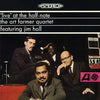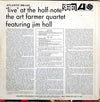



The Art Farmer Quartet - Live At The Half-Note
Art Farmer (flugelhorn) [click here to see more vinyl featuring Art Farmer]
Jim Hall (guitar) [click here to see more vinyl featuring Jim Hall]
Steve Swallow (double bass), Walter Perkins (drums)
Written Andy Razaf (A1), Benny Goodman (A1), Chick Webb (A1), Edgar Sampson (A1), iles Davis (A2), Bob Haggart (B1), Johnny Burke (B1), Irving Caesar (B2), Vincent Youmans (B2), George Bassman (B3), Ned Washington (B3)
1 LP, standard sleeve
Original analog Master tape : YES
Heavy Press : 180g
Record color : black
Speed : 33 RPM
Size : 12'’
Stereo
Live
Record Press : Pallas
Label : Speakers Corner
Original Label : Atlantic
Recording : December 1963 live at the Half Note, New York City, by Joe Atkinson, Phil Iehle and Tom Dowd
Production : Arif Mardin
Originally released in 1964
Reissued in 2020
Tracks :
Side A :
- Stompin' At The Savoy
- Swing Spring
Side B :
- What's New
- I Want To Be Happy
- I'm Getting Sentimental Over You
Reviews :
«Like many emerging trumpet players in the post WW II music scene, Art Farmer was inspired by bebop. By his own admission, he was not entirely geared toward instrumental virtuosity and speed. Farmer’s vision for his trumpet play was tonality and sound. His first big break came with Lionel Hampton’s orchestra in 1952. He shared trumpet duties with Clifford Brown, Quincy Jones and Benny Bailey. His first recording as a band leader was the 1954 LP, Art Farmer Septet (featuring arrangements by Quincy Jones and Gigi Gryce). As a sideman, Farmer collaborated with Horace Silver, Gerry Mulligan, Thelonious Monk and Charles Mingus. His versatility and improvisational skills were enhanced by “experimental” work with composer Edgar Varese (1957). He formed an iconic sextet with Benny Golson that included McCoy Tyner. Additionally, he put together a trio and quartet that featured guitarist Jim Hall. in pursuit of his aesthetic musical vision, Farmer began exploring the flugelhorn. He was uniquely responsible for its ascension in the jazz world. Additionally, he pioneered the hybrid “flumpet”. The dedication to lyricism and warmth defined Farmer for the rest of his career.
Speakers Corner Records has released a 180-gram re-mastered vinyl of The Art Farmer Quartet – Live At The Half Note. Jazz artists have been inspired by live performance, and this album is no exception. Recorded with Jim Hall (guitar), Steve Swallow (double bass) and Walter Perkins (drums), five accessible numbers are explored with unique Art Farmer musical aesthetics. Side One opens with the perennial standard “Stompin’ At The Savoy”. The tribute to the Harlem club has been recorded by Chick Webb, Benny Goodman and Art Tatum among many. Hall, Swallow and Perkins implement a small ensemble resonant tempo. Farmer enters with his customary lyrical translation and glowing tonality. As the main theme is established, Farmer and Hall communicate in adroit counterpoint. Swallow’s skipping double bass lines are propulsive and he and Perkins are very cohesive. Hall’s extended solo is wildly improvisational, but with restrained precision. He straddles hot licks and trio interaction like a pianist. It is an inventive take on the vintage jazz touchstone. Up next, dual flugelhorn/guitar lead kicks off Miles Davis’ “Swing Spring”. Farmer percolates in a near bebop frenzy with the rhythm section in tight support. Hall delivers a solo with nuanced phrasing and descending runs. Perkins executes a gritty, syncopated drum solo. Art returns with stylish trills and sustained momentum.
Side Two boasts three reinvented popular standards. “What’s New” began as a big band piece for Bob Crosby. It was subsequently recorded by Bing Crosby, Frank Sinatra, John Coltrane and Dexter Gordon, and ultimately as a centerpiece to Linda Ronstadt’s first album with Nelson Riddle. Here, Farmer plays with a sultry resonance that distills the melancholy. His runs are articulate and expressive. Another pop ditty “I Want To Be Happy” (from the 1925 play, No No Nanette) was captured with jazzy intonation by Ella Fitzgerald (with Chick Webb) in 1937. Farmer and the quartet flat out swing with chord modulations and catchy, halting rhythm patterns. His fluidity is showcased with vibrato-infused technique. Hall excels with a racing solo before Framer joins in the big finish. In a surprise, Farmer sits out the finale, “I’m Getting Sentimental Over You”. This beloved song was Tommy Dorsey’s band signature. After a moody introduction, Hall hits a mid-tempo groove with an eloquent flow of chords and notation. He is able to reign in distortion from his amplified guitar. A deft, bluesy tempo shift at the end is artful.
Speakers Corner Records has done a superb job in re-mastering The Art Farmer Quartet – Live At The Half Note to 180-gram vinyl. The stereo separation (and it is highly recommended to listen with a good pair of stereo headphones) is flawless. The integrity of the original Atlantic Records sound engineering mix is intact (including audience chatter). For a live session, there is an exceptional amount of finely tuned auditory detail. The flugelhorn is mellow and expansive. » Robbie Gerson, Audiophile Audition, Apr 21, 2020
When "The Jazztet" broke up, a sextet that he co-founded together with the tenor saxophonist Benny Golson, the flugelhornist Art Farmer became the leader of a pianoless quartet with the guitarist Jim Hall from 1963-1964. Farmer said in an interview that the quartet didn’t need a pianist because Hall could provide all the necessary chords and counterpoints. Actually a multi-instrumentalist, Farmer gave up playing the trumpet and performed in this quartet exclusively on the flugelhorn.
Together with the bassist Steve Swallow and the drummer Walter Perkins he appeared in New York’s "Half Note" jazz club, which became their base and location of their best recordings. The repertoire in this session from December 1963 is something of a surprise – five standard swing numbers plus the little-known "Swing Spring" by Miles Davis. Hall, who made a special appearance with "I’m Getting’ Sentimental Over You", was the ideal musical partner for Farmer, since both musicians were in command of a similar gentle and pensive style of improvisation, which was more complex than one expected. From the 22 tracks recorded, only these five have survived. The others were destroyed in a fire. Furthermore, the group only remained together long enough to make three LP releases. All this goes to make this album even more important, and at long last available in an appropriate format.
Ratings :
AllMusic : 4.5 / 5 , Discogs : 4.38 / 5


